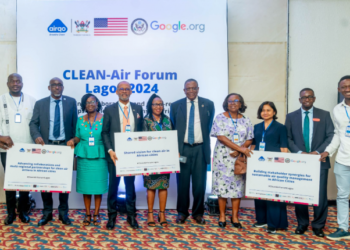Following the conclusion of the CLEAN-Air Forum Lagos 2024, partners, collaborators, and stakeholders decided to strengthen their collaboration to enhance the availability of air quality data.
Among other things, they have committed to enhancing the use of data and evidence to raise awareness and provide support for initiatives aimed at addressing the issue of air pollution in Africa and throughout the world.
Prof. Engineer Bainomugisha, the AirQo Lead at the closing ceremony of the forum, titled: “Advancing collaborations and multi-regional partnerships for clean air actions in African cities,” in Lagos urged them to bring in what they have learnt during the conference, as well as their wealth of experience, to fight air pollution in Africa.
United States Consul General in Lagos, Will Stevens, said that the forum was apt as it brought partners and from all over the world to “come together to talk about how we can keep the air and make it clean across all the cities.”
Stevens added that the Clean Air Forum helped collaborators, stakeholders, and participants to support each other to fight air pollution, affirming that “there have been solutions through this forum.”
Beyond the conference, the envoy noted that the American government is committed to addressing the problem of climate change, and air pollution and is setting up measures to tackle such challenges on the African continent and beyond.
Also at the event, the Vice-Chancellor, of the University of Lagos (UNILAG), the host, Prof. Folasade Ogunsola, commended all stakeholders, partners, collaborators, and participants for coming together to chart a way forward towards ensuring clean air on the African continent.
She asked everyone to work together to ensure clean air to have a long-term influence on the health and well-being of cities, communities, and continents, as well as to transform the world.
The event attracted 256 registered attendees from 34 African and Asian nations, as well as academia, researchers, and government officials.
The participants drew out the policy landscape throughout the continent, affirming the importance of data in advancing evidence-based policy formation for quality management.





